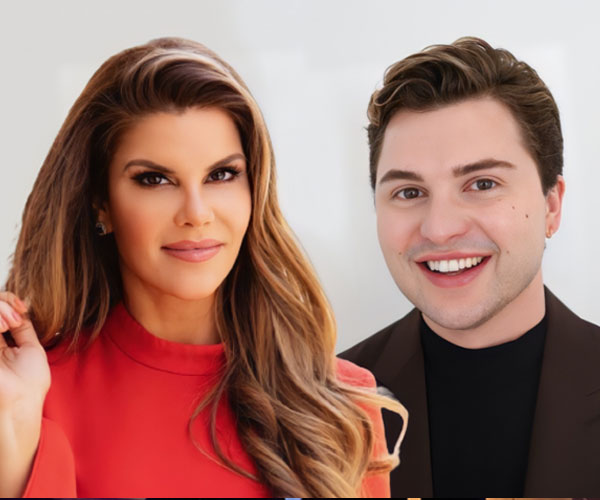Guard Your Skin for Life: A Discussion on Sun Protection with Ian Michael Crumm and Dr. Dendy Engelman
Licensed esthetician Ian Michael Crumm and board-certified dermatologist Dr. Dendy Engelman on SPF myths, how sun protection goes past skin cancer, and more.

Board-certified dermatologist Dr. Dendy Engelman and licensed esthetician Ian Michael Crumm are teaming up in the name of sun protection this Skin Cancer Awareness Month: The duo’s experiential SkinWatch event in NYC - an SPF-centered soiree loosely based on Baywatch - was designed to educate attendees on a serious topic in an approachable, playful way. In the following conversation with the two skincare professionals, we learn more about the various ways sun exposure can affect our skin, the pair’s favorite products for warding off sun damage, advice for those looking to better integrate skin protection into their everyday routines, and more.
Q: As skincare professionals, both of you have a long history of caring about the health and appearance of skin. We’d love to hear a bit about how both of you got started in your respective careers, and how your paths crossed along the way!
Ian Michael Crumm: Since I was little, I naturally gravitated towards beauty and skincare. When I got older, I had some mild acne, and I started seeing a dermatologist in central Pennsylvania. During my visits, I ended up getting exposed to the aesthetic side of things, like extraction facials, and I fell in love with the experience of getting these treatments. Over the years as a content creator, I've always ended up talking about beauty, and about five years ago, I shifted to talking almost exclusively about beauty. During the pandemic, I decided to go back to get my esthetics license. I've had my license now for about just over a year. I'm excited to keep taking courses and building on my professional knowledge, especially since I've been such an enthusiast my whole life! Dr. Dendy Engelman: I am a board-certified dermatologist, and I've been practicing since my fellowship in 2008. I’ve been seeing patients since then, but finished officially in 2009 and now work at the Taj Mahal of beauty at Shafer Clinic — everything from lasers to peels, to injectables and facelifts. We have everything, it's the happiest place on earth for adults. I too loved beauty from a young age where we used to do spa days in my parents’ Jacuzzi tub in our bathing suits for like nine hours and wash our hair 65 times and do all the facials that we knew of at the age of seven. It's no surprise that I went into the world of aesthetic medicine! Ian and I came in contact through Tyler, who runs my social media — he was fantastic to connect us years ago!
Q: Sun protection is a vital part of skin health; are you able to explain the ways in which it’s an indispensable part of one’s skincare routine?
Ian: We are so excited to have the SkinWatch event - it’s really designed to celebrate protecting your skin and teach people how to make sun protection part of their regular routines. Beyond sun protection and skin cancer, there are so many other things like hyperpigmentation, sunspots, well-aging initiatives people might want to take with SPF as that front guard. I think a lot of people think of it in terms of protecting yourself from getting burned, but there are so many other concerns that occur because of the sun. Dr. Dendy: I come at it from the perspective of “as long as you get there.” Whether you have a family history of melanoma and you're hyper worried about skin cancer, or you’re coming at it more from the “looks” perspective and all you care about is wrinkles and having even skin tone — I don't care how you get there, but I want you to get there and have it incorporated into your daily routine. I feel like in the US everybody wants the sexiness of the “correction”, where you have the before and after and can say “Look how much better I look!” But it’s better if you don’t have to correct something; it's way better than ever having all these devices, surgeries, injectables, peels and everything that Ian and I do every day to reverse it. How much better if you've never had it! So the key is protection. It's just hard to show in a compelling way the effects of SPF because if you don't ever have the wrinkles, it's hard to know what you would look like with them.
Q: SPF is something most people reach for in the summer when the weather is hot and we’re spending a lot of time outside. Can you help our audience understand why sun protection is important all year round, not just in the warmer months or in hotter climates?
Dr. Dendy: So much of what we do in skincare should be routine, and SPF is certainly part of that — just like brushing your teeth and putting on deodorant. Cumulative sun exposure over time is what causes collagen degradation and elastin breakdown, so it's not just in the summer. It's a lifetime of incidental sun over time. And it's not just wrinkles and losing elastin, it's really skin cancer related. Five blistering sunburns before the age of 20 increases your risk of melanoma by 80%. This is a deadly skin cancer! So if you're going to take things to the extreme, just outside of the realm of beauty, this is dangerous stuff that's completely preventable. Just by doing very minimal things like one extra cream, it’s going to be infinitely beneficial. Ian: To that point, I think a lot of people still associate sun and sun exposure with heat. If it's not warm out, then they're not even processing that they’re still getting UV radiation. For example, in the winter, the reflection of the light on snow is so intense. So just because you're not on a beach in a bikini doesn't mean that you're not getting really strong exposure on your face or other body parts.
Q: There are countless types of sunscreens: chemical and physical, sprays and lotions, formulas for face and body, tinted and untinted, and of course SPFs low and high. What are some tips you can provide for those who may have a hard time choosing the right sun protection for their skin?
Dr. Dendy: It is definitely overwhelming to look at the amount of offerings on your own. The good news is there is a formula that we can find that will work for you. I think Ian and I would both agree that mineral sunscreens are our favorites! Zinc oxide for example is a very good filter that sits on the surface of skin, they are much less likely to break you out because they aren't chemical sunscreens, and they're immediately effective versus having to wait 30 minutes for the effectiveness of the chemical conversion as with chemical sunscreens. People often say they don’t want to look like Casper the ghost because they’re going to be opacified from the zinc or titanium, but the reality is the formulators have done a beautiful job in formulating and making them more cosmetically elegant and more universal in application on all skin tones. None of us really apply sunscreen with the amount that we're exposed to! A good rule of thumb is to divide whatever the SPF number is on the bottle by two — that's probably the amount you're getting in reality. The way they determine SPF testing and the levels in the lab is by putting dedicated amounts on a certain area and then exposing it to ultraviolet radiation. And it's a lot, it's very thick, and it just is not practical in terms of normal human usage. It's all the same price no matter what the number is, so just go with the highest if you're truly dedicated to sun protection. Ian: I agree with that. In those tests, it's religiously applied, like within the two-hour mark. The reality is that people on vacation might be reapplying, but there are a lot of variables - like getting in the water and sweating - that get in the way. To the point of countless types of sunscreen, I think it comes down to the one you're going to use and get in the routine of using every day.
